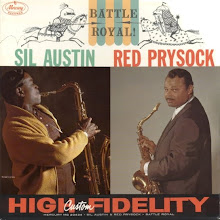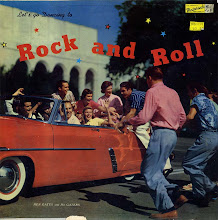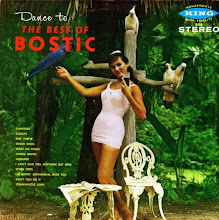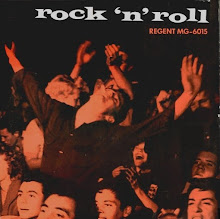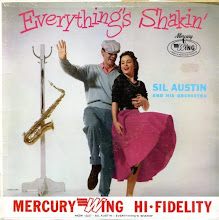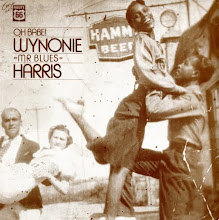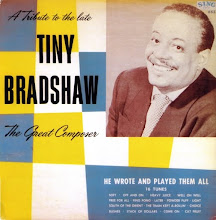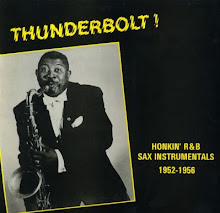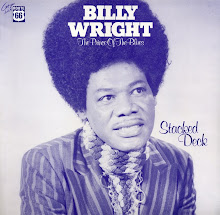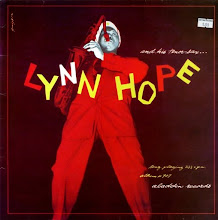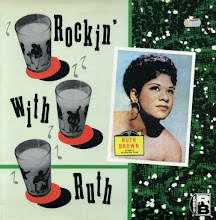Side 1:
01. Swingin' For Pappy
02. Bubbles
03. Harlem On Parade
04. We're Gonna Rock
Side 2:
01. Bongo Bounce
02. South Parkway Hop
03. Top And Bottom
04. Rocking With Leroy
Download from:
http://www47.zippyshare.com/v/3X0xjjIG/file.html
Notes on the tracks:
"Swingin' For Pappy," "Bubbles," and "Harlem On Parade" were recorded in Detroit on the 21st November 1947. Personnel: Phil Guilbeau (trumpet); Wild Bill Moore (tenor sax); Paul Williams (baritone, alto sax); Floyd Taylor (piano); Herman Hopkins (bass); Reetham Mallett (drums).
"We're Gonna Rock," "Bongo Bounce," "South Parkway Hop," "Top And Bottom," and "Rocking With Leroy" were recorded in Detroit on the 18th December 1947. Personnel: Phil Guilbeau (trumpet); Wild Bill Moore (tenor sax); Paul Williams (baritone, alto sax); T.J. Fowler (piano); Herman Hopkins (bass); Reetham Mallett (drums).
These 8 sides were originally issued as follows:
Swingin' For Pappy / Bubbles, released on Savoy 662 in January 1948. "Bill Moore And His Band."
We're Gonna Rock / Harlem On Parade released on Savoy 666 in July 1948. "Bill Moore featuring Paul Williams."
South Parkway Hop / Bongo Bounce released on Savoy 690 in March 1949. "Wild Bill Moore Sextette."
Top And Bottom / Rocking With Leroy released on Savoy 717 in November 1949. "Wild Bill Moore."
Wild Bill Moore goes into the annals of rock and roll for his 1947 Savoy recording of "We're Gonna Rock," featuring honkin' and squealin' sax from the man himself, accompanied by a moronic band chant of "we're gonna rock, we're gonna roll," all underpinned by boogie piano from T.J. Fowler and mo' riffin' sax from Paul Williams.
Released in July 1948 this proto-rocker made it into the Billboard top twenty race records chart briefly, thereby constituting Wild Bill's only entry into the national charts, although his previous single "Bubbles" had good sales in certain locations, e.g. number two in The Cash Box's New Orleans chart in March / April 1948 and number one in Chicago. Savoy also had Paul Williams' "35-30" riding high in the Cash Box New Orleans and Chicago charts at the same time.
 |
| The Cash Box July 17th 1948 |
This homemade compilation has all of Wild Bill's single releases on Savoy, which amounted to only four discs, recorded at two sessions. The Bill Moore story is rather sketchy in places. Wikipedia claims he was born in Detroit but every other source I've looked at gives his place of birth as Houston, Texas, on June 13, 1918. He did spend prolonged periods working in the Detroit area as well as in Los Angeles. His first recording date was in New York in 1944 as a backing musician on a Christine Chatman session for Decca.
In 1945, 1946 and most of 1947 he was involved in a series of recording sessions in Los Angeles. In August 1945 he was part of the Bill Doggett Octet which backed Helen Humes on Philo / Aladdin, a session which produced the smash hit "Be-Baba-Leba." In September he was on a Slim Gaillard session for Queen and in December 1945 he played on an Apollo recording session for blues shouter Duke Henderson. Three and a half years later two sides from this session were released in March 1949 under Wild Bill's name - "Homecoming Blues" (a Duke Henderson vocal) and the instrumental "Boulevard Boogie." The vocal was dated - referring to a return from World War Two - and the instrumental sounded like an arrangement from 1945 rather than 1949.
Wild Bill continued to record in LA through 1946, starting with a Joe Turner session for National on January 23rd in which the backing group was billed as "Bill Moore's Lucky Seven Band." A week later Bill was once more backing Joe Turner for National as part of a group billed as "Joe Turner's All Stars" which also included Russell Jacquet and Camille Howard. In February he was part of a Jack McVea led group at a session for Black & White and later in the same year he backed Helen Humes in a session for the same label.
On July 6th 1947 Wild Bill Moore took part in the "Hollywood Jazz Concert" at the Elks Auditorium on South Central Avenue. This event was organised by promoter Jack Williams as a concert / dance featuring top beboppers Dexter Gordon, Wardell Gray, Sonny Criss and Howard McGhee. Also on the bill was a band featuring Bill Moore and fellow tenor sax man Gene Montgomery. The entire concert was recorded by Ralph Bass with a view to persuading Herman Lubinsky to release extracts on 78 rpm discs on the Savoy label. Bass was particularly impressed by the tenor sax battles between Gordon and Gray and having failed to secure releases on Savoy, released extracts of what were in fact extended jam sessions on his own Bop label.
Along with the Dexter Gordon / Wardell Gray sides, he released extracts from the Wild Bill Moore / Gene Montgomery "Perdido" jam as "Wild Bill Parts 1 & 2" on Bop 103, a disc which was the first to be released under Bill's name. Savoy eventually acquired the Bass masters and released the Wardell Gray / Dexter Gordon tracks in various formats, culminating in the 2LP set "The Hunt." The Wild Bill Moore / Gene Montgomery jam on "What Is This Thing Called Love" eventually emerged on another Savoy 2LP set, "Black California Vol. 2."
Finally Savoy Jazz released a 3CD set in 2004, "Bopland" which featured the complete Elks Auditorium concert including the full 20 minutes of Wild Bill Moore and Gene Montgomery's "Perdido."
Towards the end of 1947 Wild Bill was in Detroit where he recorded the tracks on our featured compilation for Savoy on November 21st and December 18th. At around the same time (November 20th and December 20th) he was recording tracks with Paul Williams which were released as Paul Williams Sextet records. On December 19th he took part in a King Porter (James A. Pope) recording session for the King label.
Bill was involved in further Paul Williams Savoy sessions in Detroit during March 1948, playing on "Waxie Maxie," "The Twister," and "Spider Sent Me." The next Paul Williams session (at which "The Hucklebuck" was recorded) was in December 1948, by which time Bill had left the band.
Things get a bit vague now regarding Bill's session dates for much of 1948-49. We have already referred to the March 1949 release of two Apollo sides recorded by Bill in 1945 with Duke Henderson. We know that Bill recorded four sides for Modern in LA, possibly some time in 1948. One of the sides "Rock And Roll" was released in June 1949 (Modern 674) and a follow up, "Dubble Bubble" (Modern 687) was released in July 1949.
A Wild Bill disc "Football Boogie" / "Blue Journey" was released on Sensation in November 1949. Discographies usually list this as being recorded sometime around 1954, but obviously with the disc being reviewed in the 19th November 1949 issue of Billboard, this is impossible. The recording session may have been sometime in 1949 and possibly in Detroit.
An interesting point in the review is that "Football Boogie" is described as having "suspiciously loud crowd noises" - obviously inferring that crowd noise had been dubbed in to give the impression that it was recorded live. The version of "Football Boogie" on the Blue Moon CD "Wild Bill Moore The Complete Recordings Volume 2 1948-1955" does not feature any crowd noises. It does have lots of crackling and hissing.
Bill took part in another King Porter session for King on June 7th 1949 in Cincinnati, with "Come On In" / "Battle Axe" being released in January 1950.
Another release during this period was "Steam Heat" / "Wanda Lee Blues" credited to Wild Bill Moore And His Wild Cats on the obscure Alben label. These sides are thought to have been recorded in Detroit in 1948 or 1949.
Bill's recording career becomes easier to trace from late 1949 onwards with a session for Regal in New York on October 26th of that year. On March 3rd 1950 he recorded four sides for King in New York, the resultant two discs being released in May and August 1950 - "Rock Bottom" / "Neck Bones And Collard Greens" and "Hey-Spo-Dee-O-Dee" / "Balancing With Bill." These are four tremendous sides which I first came across on the old Westside CD "Groove Station" - a comp of King and Federal sax instros including Al Sears, Preston Love and Jesse Powell as well as Wild Bill.
There was one more session for King in Detroit in August 1950 which was followed by a hiatus of around 5 years when Bill recorded two sides for Old Town - "Slow Drag" and "Big Bubble" probably around 1955-56.
Like many of his R&B / jazz sax contemporaries, Bill recorded some soul jazz LPs in the early 1960s - "Wild Bill's Beat" and "Bottom Groove" for Jazzland in 1961. In 2009 Concord Music combined both LPs on one CD called "Bottom Groove." It seems to be out of print but you can hear the music on Spotify or YouTube. I was so impressed that I've ordered a second hand copy of the CD.
Bill remained active in music and featured on Marvin Gaye's "Mercy Mercy Me (The Ecology)" in 1971. He moved back to California where he died in 1983. By some strange coincidence while I was writing this blog post the latest issue of Blues and Rhythm magazine arrived. It contains a hitherto unpublished 1974 interview with guitarist Pee Wee Crayton and there, on the final page of the article is a photo of Wild Bill Moore on stage with Pee Wee Crayton and Percy Mayfield at a blues festival in 1982. It looks like Wild Bill was still rockin' almost to the very end.
Further listening - Bill's complete 1940s and 1950s recordings were compiled on two Blue Moon CDs in 2004. They are sadly hard to find nowadays, especially Volume 1. If you find copies, grab 'em!






































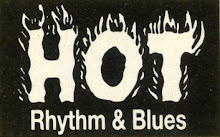
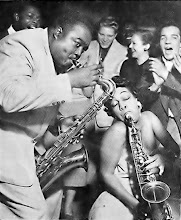






.jpg)

%2045%20-%20502B.png)















